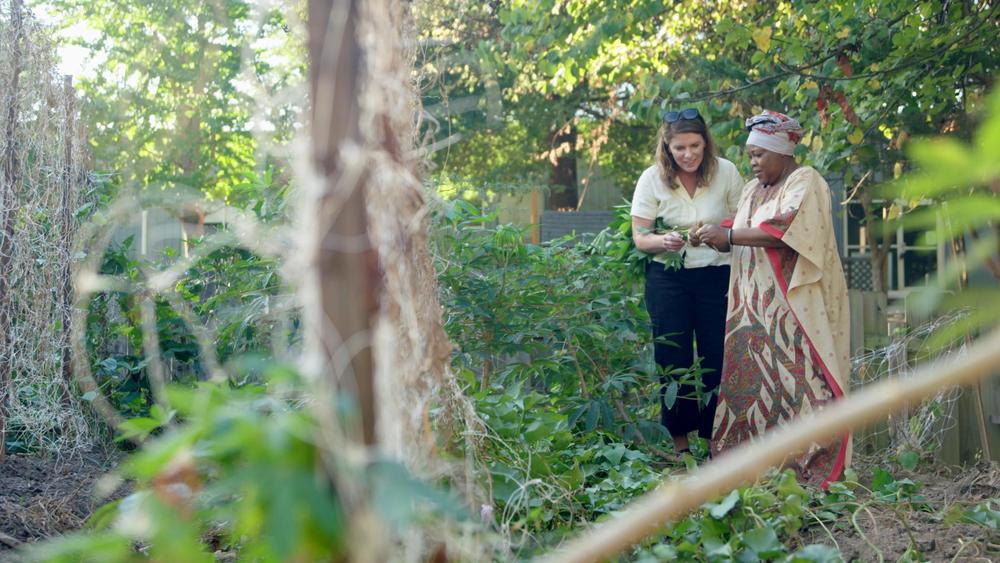Section Branding
Header Content
In 'Somewhere South,' Chef Vivian Howard Explores The History And Variety Of Modern Southern Cooking
Primary Content
"On Second Thought" host Virginia Prescott spoke with Chef Vivian Howard.
Until she was in her 30s, Vivian Howard was ashamed of being from rural North Carolina, and the food she grew up eating felt embarrassing.
Thankfully, a number of influential cooks, critics and restaurants ushered in a revival of Southern food — and Howard is among them. She’s a chef, restaurateur, writer and Peabody award-winning television host. Her new series, Somewhere South, began last month on PBS. Each of the six episodes explores a single dish, and how those foods reflect the history, evolution and people of the region.
Howard calls the American South “her classroom,” and the dishes her “roadmap.” She said she first had the idea for the series when, while pitching a book idea to her editor, she made the observation that there are only around 20 kinds of dishes worldwide.
“We all eat some version of porridge, or we have some sort of barbeque no matter where we come from, or what our community looks like,” she shared. “We sought out communities in and around the South that their story’s not often told, but that there’s a really rich history present there in their communities.”
In the series, Howard makes a point of highlighting the role that Native Americans, enslaved Africans, and black Americans played in shaping the menu of the South. In one episode, Howard and her guests draw connections between Southern hospitality and the history of Native Americans sharing local food with colonial settlers; in another, she explores the significant role West African slaves played in establishing Charleston’s rice economy.
The show also speaks to the ways that new migrants to the South, whether from other states or countries, have adapted their food and cooking to suit the place they’ve landed. Howard says that exploring how those traditions change is one of the main goals of the series.
“So many of the things that we appreciate as Southern food — collards, okra — they all came from other places,” she shared. “They were part of traditions that people brought with them, and then they [have] become touchstones of the culture here. And this [series] was all about trying to trace that, in a modern way.”
INTERVIEW HIGHLIGHTS
On how Howard came to appreciate the food she grew up eating
I read this book by Edna Lewis, The Taste of Country Cooking. And it was so beautifully written. And so much of what she talked about, and the way that her family with the seasons, and the dishes that they prepared, it really — I saw my food in that, and it gave it value.
So, I had always thought that Southern food had to be from a city, like Charleston or Savannah or New Orleans. And what I realized is that really, I grew up eating the food of the frugal farmer, and that really represents a huge swath of the way people ate in the South for so long.
And so, I guess I started to see it for the valuable cuisine rooted in tons of history and storytelling and resourcefulness. I started to see it for what it was.
On Howard’s process of coming into her own as a Southern chef
I think that as a cook, the food that you cook is it's best when it's attached to a story or it has some sort of meaning for you. And so, when I was able to embrace the food that I grew up eating, my food became so much better. I think that that is a part of every chef's coming into their own — is like finding their voice, and connecting it to their place, and their past, and their story.
And that's something that we've seen a lot shooting Somewhere South. A lot of the people that we learned from are first- or second-generation immigrants. And we found that, the first generation, they maybe don't celebrate the foods of the place where they came from.
Maybe they're a little bit ashamed of them, and they desperately want to embrace the hamburgers and hot dogs and French fries of the United States. But then that changes. And, the second generation celebrates those foods and really makes a point of making sure that their children know where their people came from. And so I think that happens for a lot of people at different times and for different reasons.
On how coronavirus has affected workers that support the restaurant business
It's terrible for them. Both big farmers and small farmers are really suffering under this. The farmers that I work with in my restaurants, they sell most of what they grow to restaurants. And so that hurts them very quickly.
This is unprecedented. And, you know, farmers are in a position where they need cash flow as well — they need cash flow so they can invest in planting and feeding their animals, so that when we come out on the other side of this, there's something for us to eat.
Get in touch with us.
Twitter: @OSTTalk
Facebook: OnSecondThought
Email: OnSecondThought@gpb.org
Phone: 404-500-9457




